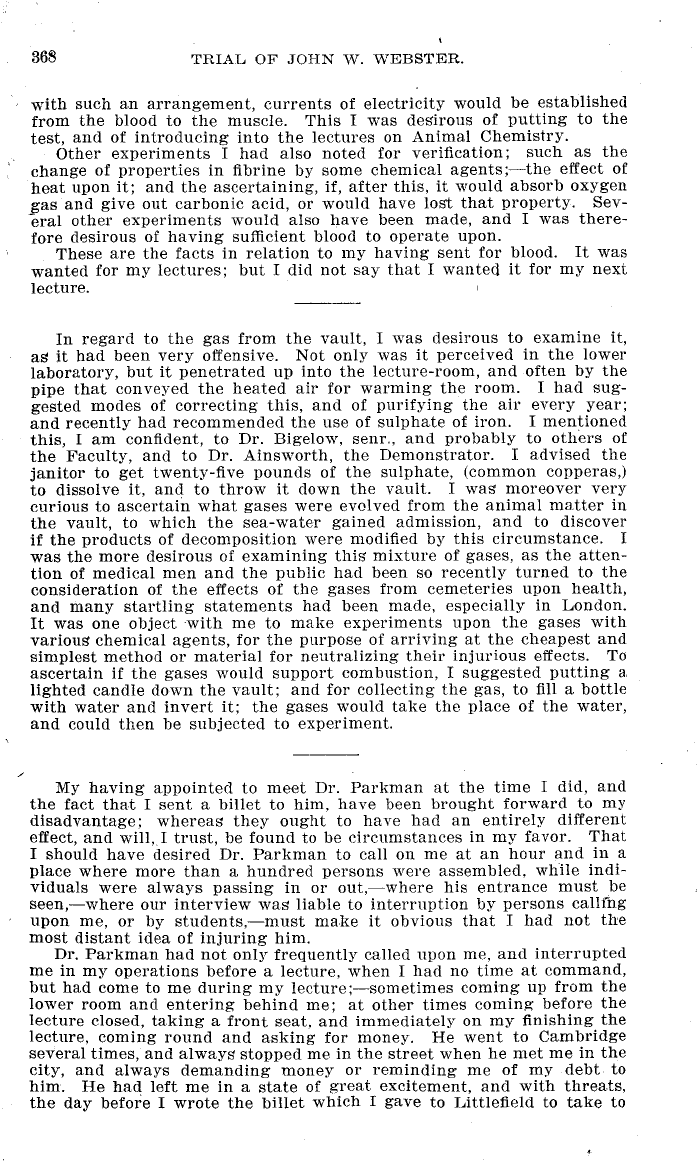|
368 TRIAL OF JOHN W. WEBSTER.
with such an arrangement, currents of electricity would be established
from the blood to the muscle. This I was desirous of putting to the
test, and of introducing into the lectures on Animal Chemistry.
Other experiments I had also noted for verification; such as the
change of properties in fibrine by some chemical agents; the effect of
heat upon it; and the ascertaining, if, after this, it would absorb oxygen
gas and give out carbonic acid, or would have lost that property. Sev-
eral other experiments would also have been made, and I was there-
fore desirous of having sufficient blood to operate upon.
These are the facts in relation to my having sent for blood. It was
wanted for my lectures; but I did not say that I wanted it for my next
lecture.
In regard to the gas from the vault, I was desirous to examine it,
as it had been very offensive. Not only was it perceived in the lower
laboratory, but it penetrated up into the lecture-room, and often by the
pipe that conveyed the heated air for warming the room. I had sug-
gested modes of correcting this, and of purifying the air every year;
and recently had recommended the use of sulphate of iron. I mentioned
this, I am confident, to Dr. Bigelow, senr., and probably to others of
the Faculty, and to Dr. Ainsworth, the Demonstrator. I advised the
janitor to get twenty-five pounds of the sulphate, (common copperas,)
to dissolve it, and to throw it down the vault. I was moreover very
curious to ascertain what gases were evolved from the animal matter in
the vault, to which the sea-water gained admission, and to discover
if the products of decomposition were modified by this circumstance. I
was the more desirous of examining this mixture of gases, as the atten-
tion of medical men and the public had been so recently turned to the
consideration of the effects of the gases from cemeteries upon health,
and many startling statements had been made, especially in London.
It was one object with me to make experiments upon the gases with
various chemical agents, for the purpose of arriving at the cheapest and
simplest method or material for neutralizing their injurious effects. To
ascertain if the gases would support combustion, I suggested putting a
lighted candle down the vault; and for collecting the gas, to fill a bottle
with water and invert it; the gases would take the place of the water,
and could then be subjected to experiment.
My having appointed to meet Dr. Parkman at the time I did, and
the fact that I sent a billet to him, have been brought forward to my
disadvantage; whereas they ought to have had an entirely different
effect, and will, ,l trust, be found to be circumstances in my favor. That
I should have desired Dr. Parkman to call on me at an hour and in a
place where more than a hundred persons were assembled, while indi-
viduals were always passing in or out,-where his entrance must be
seen,-where our interview was liable to interruption by persons callfrig
upon me, or by students,-must make it obvious that I had not the
most distant idea of injuring him.
Dr. Parkman had not only frequently called upon me, and interrupted
me in my operations before a lecture, when I had no time at command,
but had come to me during my lecture;-sometimes coming up from the
lower room and entering behind me; at other times coming before the
lecture closed, taking a front seat, and immediately on my finishing the
lecture, coming round and asking for money. He went to Cambridge
several times, and always stopped me in the street when he met me in the
city, and always demanding money or reminding me of my debt to
him. He had left me in a state of great excitement, and with threats,
the day before I wrote the billet which I gave to Littlefield to take to
|

